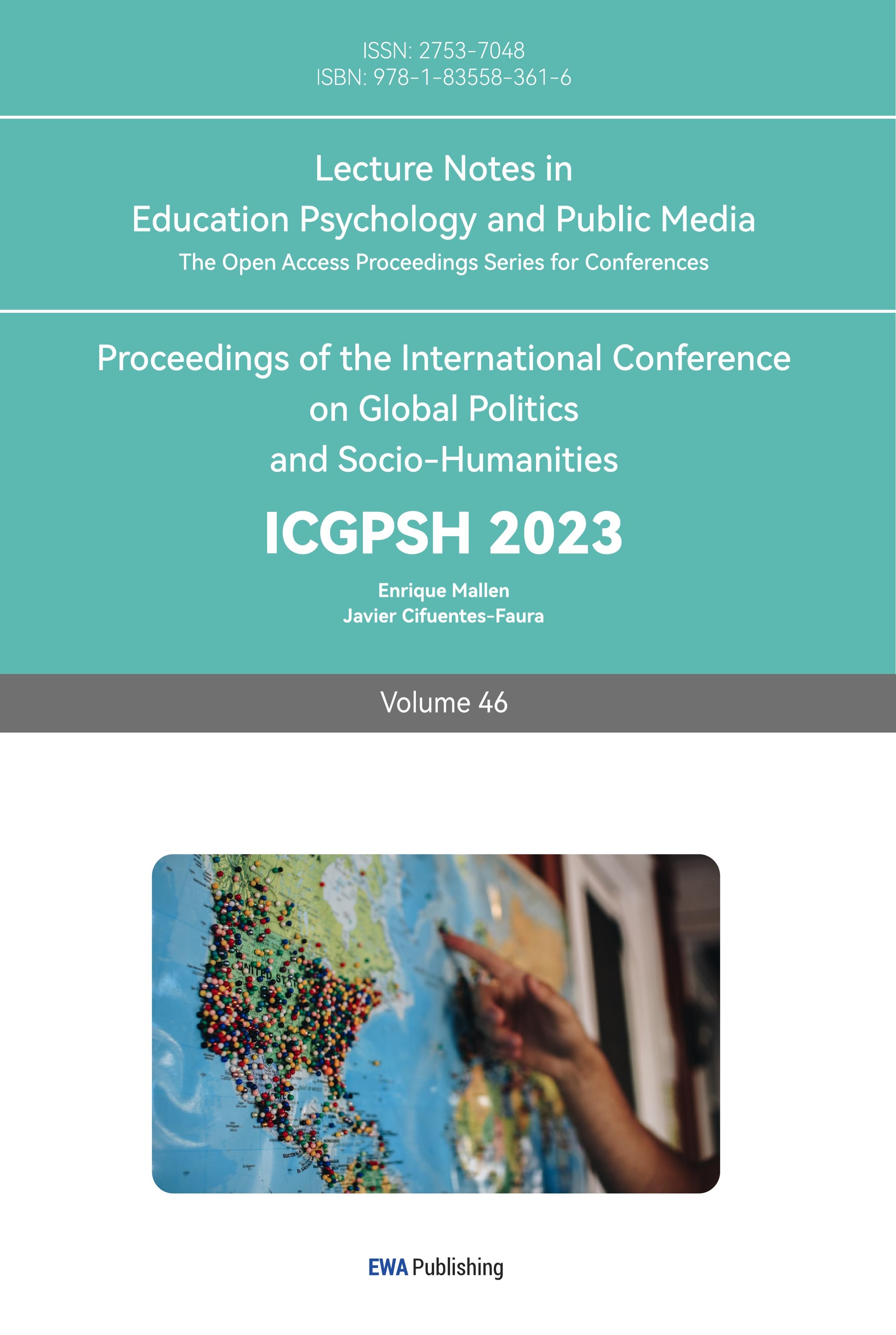References
[1]. Dingliang Tan. Learning Style Theory [M]. Nanjing: Jiangsu Education Press, 1995.
[2]. YB Liu. (2010). Two epistemological orientations in the study of Western second language acquisition theory - Implications for foreign language research in China. Journal of Northeastern Normal University (Philosophy and Social Science Edition) (04), 86-92. doi: 10.16164/j.cnki.22-1062/c.2010.04.006.
[3]. Xiuping Ban, Suxia Yan, Ruijiao Ban et al. A case study of healthy personality development based on personality trait theory[J]. Journal of Hebei North College (Social Science Edition),2023,39(01):73-76.
[4]. Junwu Dong. Research on building a personalized learning system [D]. East China Normal University,2016.
[5]. Yuwei He, Xianjun Li. The construction and inspiration of personalized learning system in Vermont, USA[J]. Education Reference,2023,No.303(03):61-67.
[6]. Hao Zhang, Jinhan Zhang. A study on the influence of four dimensions of MBTI occupational personality test on language learning--the IELTS test as an example[J]. Psychological Monthly,2023,18(04):72 74+78. DOI: 10.19738/j.cnki.psy.2023.04.019.
[7]. İSMAİL ERTON. (2010). Relations between personality traits, language learning styles and success in foreign language achievement. hacettepe university journal of education, 38(38), 115-126.
[8]. Derakhshan, A., & Shakki, F. (2018). An Investigation Into the Relationship Between Iranian EFL High- and Low-Proficient Learners and Their Learning Styles. SAGE Open, 8(4).
[9]. Shuang Ying, Junru Gao, Qi Cui. Research on college students' independent learning strategies in the foreign language catechism environment[J]. English Abroad,2023, No.490(06):163-165.
[10]. Lijun Huo, Nan Sun, Rongmei Sun et al. Research on methods to improve college students' independent learning ability[J]. Innovation and Entrepreneurship Theory Research and Practice,2023,6(05):66-68.
[11]. Qiao Sun. (2017). The relationship between high school students' independent learning methods and their performance in English. English for Secondary School Students (42), 46.
[12]. Lu Li. (2021). English learning Interest precedence. Henan Education (Teacher Education) (06), 71. doi:10.16586/j.cnki.41-1033/g4.2021.06.045.
[13]. Lin Lu. (2023). On the development of independent learning ability in high school English... (eds.) Proceedings of the Symposium on Teacher Development Forum of Guangdong Teachers' Continuing Education Society (VII) (pp. 970-975). Proceedings of the Symposium on Teacher Development Forum of Guangdong Teachers' Continuing Education Society (vii).
Cite this article
Chen,J.;Yang,W. (2024). The Relationships Between Learning Styles and L2 English Learning. Lecture Notes in Education Psychology and Public Media,46,153-161.
Data availability
The datasets used and/or analyzed during the current study will be available from the authors upon reasonable request.
Disclaimer/Publisher's Note
The statements, opinions and data contained in all publications are solely those of the individual author(s) and contributor(s) and not of EWA Publishing and/or the editor(s). EWA Publishing and/or the editor(s) disclaim responsibility for any injury to people or property resulting from any ideas, methods, instructions or products referred to in the content.
About volume
Volume title: Proceedings of the International Conference on Global Politics and Socio-Humanities
© 2024 by the author(s). Licensee EWA Publishing, Oxford, UK. This article is an open access article distributed under the terms and
conditions of the Creative Commons Attribution (CC BY) license. Authors who
publish this series agree to the following terms:
1. Authors retain copyright and grant the series right of first publication with the work simultaneously licensed under a Creative Commons
Attribution License that allows others to share the work with an acknowledgment of the work's authorship and initial publication in this
series.
2. Authors are able to enter into separate, additional contractual arrangements for the non-exclusive distribution of the series's published
version of the work (e.g., post it to an institutional repository or publish it in a book), with an acknowledgment of its initial
publication in this series.
3. Authors are permitted and encouraged to post their work online (e.g., in institutional repositories or on their website) prior to and
during the submission process, as it can lead to productive exchanges, as well as earlier and greater citation of published work (See
Open access policy for details).
References
[1]. Dingliang Tan. Learning Style Theory [M]. Nanjing: Jiangsu Education Press, 1995.
[2]. YB Liu. (2010). Two epistemological orientations in the study of Western second language acquisition theory - Implications for foreign language research in China. Journal of Northeastern Normal University (Philosophy and Social Science Edition) (04), 86-92. doi: 10.16164/j.cnki.22-1062/c.2010.04.006.
[3]. Xiuping Ban, Suxia Yan, Ruijiao Ban et al. A case study of healthy personality development based on personality trait theory[J]. Journal of Hebei North College (Social Science Edition),2023,39(01):73-76.
[4]. Junwu Dong. Research on building a personalized learning system [D]. East China Normal University,2016.
[5]. Yuwei He, Xianjun Li. The construction and inspiration of personalized learning system in Vermont, USA[J]. Education Reference,2023,No.303(03):61-67.
[6]. Hao Zhang, Jinhan Zhang. A study on the influence of four dimensions of MBTI occupational personality test on language learning--the IELTS test as an example[J]. Psychological Monthly,2023,18(04):72 74+78. DOI: 10.19738/j.cnki.psy.2023.04.019.
[7]. İSMAİL ERTON. (2010). Relations between personality traits, language learning styles and success in foreign language achievement. hacettepe university journal of education, 38(38), 115-126.
[8]. Derakhshan, A., & Shakki, F. (2018). An Investigation Into the Relationship Between Iranian EFL High- and Low-Proficient Learners and Their Learning Styles. SAGE Open, 8(4).
[9]. Shuang Ying, Junru Gao, Qi Cui. Research on college students' independent learning strategies in the foreign language catechism environment[J]. English Abroad,2023, No.490(06):163-165.
[10]. Lijun Huo, Nan Sun, Rongmei Sun et al. Research on methods to improve college students' independent learning ability[J]. Innovation and Entrepreneurship Theory Research and Practice,2023,6(05):66-68.
[11]. Qiao Sun. (2017). The relationship between high school students' independent learning methods and their performance in English. English for Secondary School Students (42), 46.
[12]. Lu Li. (2021). English learning Interest precedence. Henan Education (Teacher Education) (06), 71. doi:10.16586/j.cnki.41-1033/g4.2021.06.045.
[13]. Lin Lu. (2023). On the development of independent learning ability in high school English... (eds.) Proceedings of the Symposium on Teacher Development Forum of Guangdong Teachers' Continuing Education Society (VII) (pp. 970-975). Proceedings of the Symposium on Teacher Development Forum of Guangdong Teachers' Continuing Education Society (vii).









